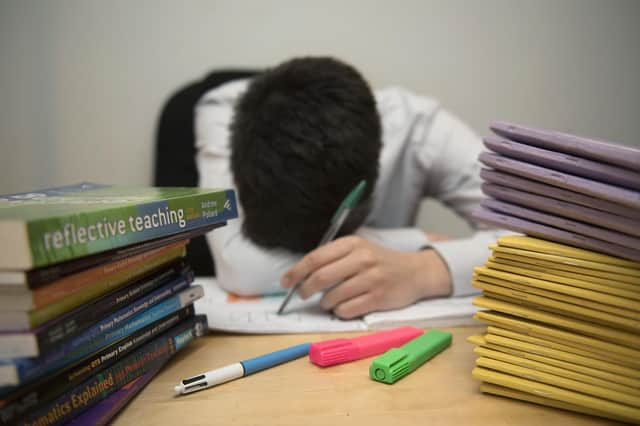Scottish education: After 40 years as a teacher, here's what I think is wrong with our schools – Cameron Wyllie


It’s a memoir – hopefully an amusing and thought-provoking one – about my career in teaching. The other is my mark book for my first year in teaching, school session 1980-81. I was 23, very skinny, bespectacled, perhaps… possibly… a tiny bit camp and I had been appointed to teach English and history (the latter about which I knew almost nothing) at Daniel Stewart’s and Melville College (DSMC), the independent boys’ school in west Edinburgh where I had had my first teaching practice.
I am looking at the names of my first-ever first year class; they were 12 then and will be 54 now. They are all over the world, I expect, and some of them will probably be grandparents.
Advertisement
Hide AdAdvertisement
Hide AdI more or less remember them all: Brian, Ronnie, Simon, Bruce, Colin, Jamie and several Andrews, one of whom wrote an excellent poem about a goldfish. When he was 12 in 1981. I can quote from it. Given that I can’t remember what I did two days ago without consulting my diary, this is odd.
It’s very exciting for an ex-teacher of English to publish a book; the whole experience is slightly unreal: suffice to say I welled up when I saw my own Amazon page. My book was on a shelf at the Aye Write Festival in Glasgow, with a "signed by the author” sticker. I am that author. I signed it. Extraordinary. I just wish my old dad was here to see it. He would quietly have bought every copy in town.
Anyway! Writing this opus, mainly during the pandemic, made me think and think about episodes from my teaching career: in the classroom, on school trips, with young people, with colleagues.
Eight thousand pupils. A hundred thousand laughs and many tears. Thousands of reports to write, and hundreds of parents’ nights. Parenting, about which I write quite a bit, and which I have never done, is the hardest job in the world. Even harder than teaching.
These days I think most people in Scottish society admire teachers, but they admire them in the way they admire bomb-disposal experts, not in the way they admire doctors. All of this made me think about the ways in which teachers and students and schools have changed in the past 40 years.
When I started teaching there was me, the blackboard, a few sticks of chalk (one was orange) and a blackboard duster, which frequently disappeared and basically didn’t work anyway.
So there was rather a lot of emphasis on me. If I was boring there was, apart from whatever text we were studying, no escape. Teaching in 2022 is inevitably different, what with the internet, the projector, the visualiser, the laptops, the iPads, outdoor learning, mindset classes etc etc.
And, across the piece, teaching is better. The English department at DSMC in my first year of teaching was wonderful: I was very lucky to have the wisdom and experience of those people to guide me.
Advertisement
Hide AdAdvertisement
Hide AdBut in Scotland in 1980, there were, in every school, some crap teachers. Nowadays, it’s very hard to get into teacher training, hard to get qualified and very hard to get a permanent job. Teachers are scrutinised much more closely.
Young people are less inclined to adore one teacher at the expense of all the others. And if, sigh, a bit of charisma has gone, if less teachers are ‘characters’ (remember some of them were characters from zombie movies) then so be it.
Kids. Young people. Boys and girls. These days, curiously more confident but also more fragile. Does that even make sense? Most young people are glorious, kind and motivated, but lots suffer from a slew of mental health issues, leaving the CAMHS service inundated. Why has this happened?
Parenting has changed (there is so much to say about this I could write another book); social media obviously, with its constant judgements and 24-hour pressures; life is simply so much more complicated. I am so glad that I was young when I was young.
My career was in independent schools in Edinburgh and I only ever worked in two schools. Edinburgh is, of course, extraordinarily peculiar, having so many private schools.
When I started teaching the essential differences between the independent schools and Edinburgh’s better-off state schools were to do with facilities and available activities, with maybe a greater adherence to disciplinary rules and uniform adherence; maybe smaller class sizes (though that first-year class in 1980 was 30).
Now state schools rigorously follow Curriculum for Excellence, and the Scottish Government is considering abolishing school uniform and lots of teachers in state schools want to leave the profession. What, I ask myself, has happened?
Too much regulation. Too little autonomy for headteachers. Too little money. Too little support for teachers in the classroom, and too much emphasis on making them do more work under the guise of professional development. Too much understanding of bad behaviour. Too few extra-curricular activities. Too much stress and not enough appreciation. There’s a start.
Advertisement
Hide AdAdvertisement
Hide AdAnyway, whatever has happened to education more widely in these 40 years, I loved my job. As my book says: “My career is a journey of people, young, old, dead, exuberantly alive, and it is a journey of which I do not regret a single moment.”
Cameron Wyllie writes a blog called A House in Joppa. His book, Is There A Pigeon in the Room? My Life in Schools, is published by Birlinn.
Comments
Want to join the conversation? Please or to comment on this article.
